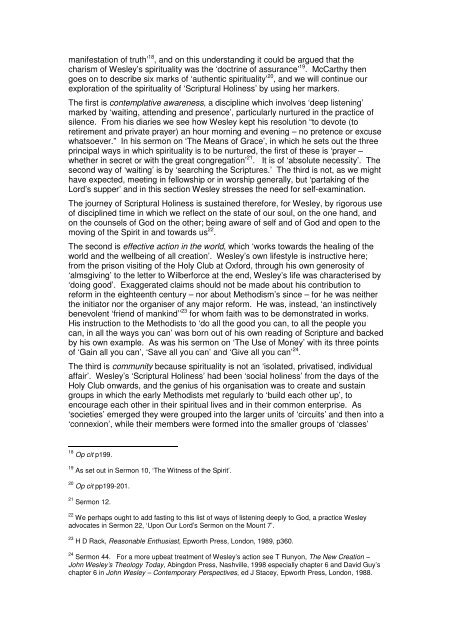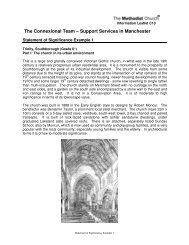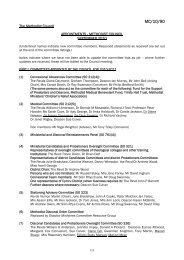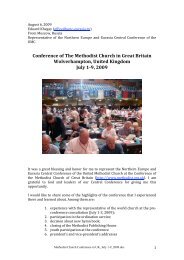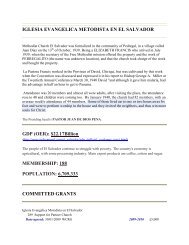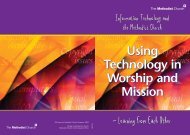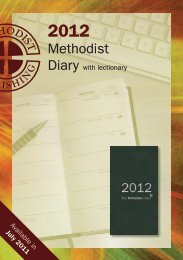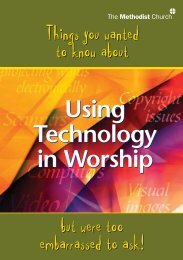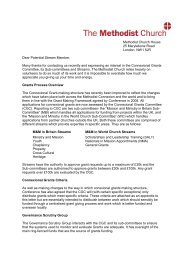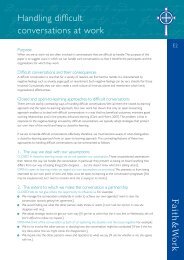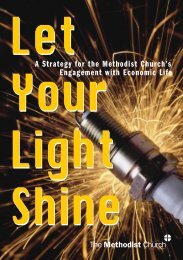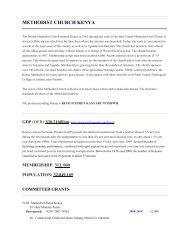Scriptural Holiness - The Methodist Church of Great Britain
Scriptural Holiness - The Methodist Church of Great Britain
Scriptural Holiness - The Methodist Church of Great Britain
- No tags were found...
You also want an ePaper? Increase the reach of your titles
YUMPU automatically turns print PDFs into web optimized ePapers that Google loves.
manifestation <strong>of</strong> truth’ 18 , and on this understanding it could be argued that thecharism <strong>of</strong> Wesley’s spirituality was the ‘doctrine <strong>of</strong> assurance’ 19 . McCarthy thengoes on to describe six marks <strong>of</strong> ‘authentic spirituality’ 20 , and we will continue ourexploration <strong>of</strong> the spirituality <strong>of</strong> ‘<strong>Scriptural</strong> <strong>Holiness</strong>’ by using her markers.<strong>The</strong> first is contemplative awareness, a discipline which involves ‘deep listening’marked by ‘waiting, attending and presence’, particularly nurtured in the practice <strong>of</strong>silence. From his diaries we see how Wesley kept his resolution “to devote (toretirement and private prayer) an hour morning and evening – no pretence or excusewhatsoever.” In his sermon on ‘<strong>The</strong> Means <strong>of</strong> Grace’, in which he sets out the threeprincipal ways in which spirituality is to be nurtured, the first <strong>of</strong> these is ‘prayer –whether in secret or with the great congregation’ 21 . It is <strong>of</strong> ‘absolute necessity’. <strong>The</strong>second way <strong>of</strong> ‘waiting’ is by ‘searching the Scriptures.’ <strong>The</strong> third is not, as we mighthave expected, meeting in fellowship or in worship generally, but ‘partaking <strong>of</strong> theLord’s supper’ and in this section Wesley stresses the need for self-examination.<strong>The</strong> journey <strong>of</strong> <strong>Scriptural</strong> <strong>Holiness</strong> is sustained therefore, for Wesley, by rigorous use<strong>of</strong> disciplined time in which we reflect on the state <strong>of</strong> our soul, on the one hand, andon the counsels <strong>of</strong> God on the other; being aware <strong>of</strong> self and <strong>of</strong> God and open to themoving <strong>of</strong> the Spirit in and towards us 22 .<strong>The</strong> second is effective action in the world, which ‘works towards the healing <strong>of</strong> theworld and the wellbeing <strong>of</strong> all creation’. Wesley’s own lifestyle is instructive here;from the prison visiting <strong>of</strong> the Holy Club at Oxford, through his own generosity <strong>of</strong>‘almsgiving’ to the letter to Wilberforce at the end, Wesley’s life was characterised by‘doing good’. Exaggerated claims should not be made about his contribution toreform in the eighteenth century – nor about Methodism’s since – for he was neitherthe initiator nor the organiser <strong>of</strong> any major reform. He was, instead, ‘an instinctivelybenevolent ‘friend <strong>of</strong> mankind’’ 23 for whom faith was to be demonstrated in works.His instruction to the <strong>Methodist</strong>s to ‘do all the good you can, to all the people youcan, in all the ways you can’ was born out <strong>of</strong> his own reading <strong>of</strong> Scripture and backedby his own example. As was his sermon on ‘<strong>The</strong> Use <strong>of</strong> Money’ with its three points<strong>of</strong> ‘Gain all you can’, ‘Save all you can’ and ‘Give all you can’ 24 .<strong>The</strong> third is community because spirituality is not an ‘isolated, privatised, individualaffair’. Wesley’s ‘<strong>Scriptural</strong> <strong>Holiness</strong>’ had been ‘social holiness’ from the days <strong>of</strong> theHoly Club onwards, and the genius <strong>of</strong> his organisation was to create and sustaingroups in which the early <strong>Methodist</strong>s met regularly to ‘build each other up’, toencourage each other in their spiritual lives and in their common enterprise. As‘societies’ emerged they were grouped into the larger units <strong>of</strong> ‘circuits’ and then into a‘connexion’, while their members were formed into the smaller groups <strong>of</strong> ‘classes’18 Op cit p199.19 As set out in Sermon 10, ‘<strong>The</strong> Witness <strong>of</strong> the Spirit’.20 Op cit pp199-201.21 Sermon 12.22 We perhaps ought to add fasting to this list <strong>of</strong> ways <strong>of</strong> listening deeply to God, a practice Wesleyadvocates in Sermon 22, ‘Upon Our Lord’s Sermon on the Mount 7’.23 H D Rack, Reasonable Enthusiast, Epworth Press, London, 1989, p360.24 Sermon 44. For a more upbeat treatment <strong>of</strong> Wesley’s action see T Runyon, <strong>The</strong> New Creation –John Wesley’s <strong>The</strong>ology Today, Abingdon Press, Nashville, 1998 especially chapter 6 and David Guy’schapter 6 in John Wesley – Contemporary Perspectives, ed J Stacey, Epworth Press, London, 1988.


